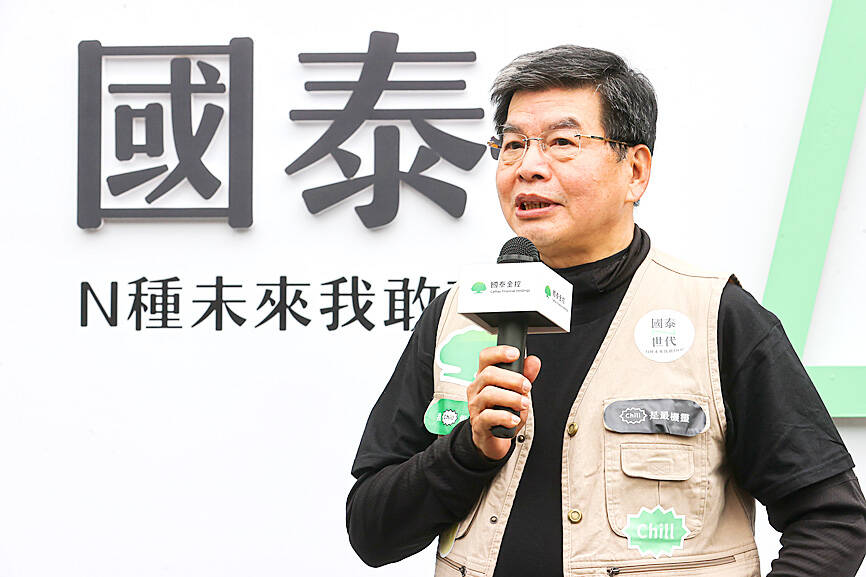Cathay Financial Holding Co (國泰金控) yesterday said that it expects high single-digit loan growth and flat interest margin this year, aided by improving operating conditions and expected interest rate cuts by the US.
The nation’s largest financial conglomerate by asset value gave the guarded optimistic view during an investors’ conference in Taipei, after growing its net income by 36 percent last year to NT$51.5 billion (US$1.63 billion), or earnings of NT$3.24 per share.
Its main subsidiary, Cathay United Bank (國泰世華銀行), generated 56.3 percent of the earnings, thanks to healthy interest and fee income increases, the firm said.

Photo: CNA
Outstanding loans last year registered a 12 percent advance, while deposits rose 9 percent, allowing the bank’s net interest income to gain 4 basis points to 1.38 percent, it said.
“We’re looking at a high single-digit rise in loans and a flat net interest margin for this year,” as the economy is picking up modest momentum at home and abroad, and interest rates could drop if the US Federal Reserve cuts interest rates, company officials said.
Cathay Financial is betting on three rate cuts by the Fed from the second half of this year.
Taiwan’s interest rate gaps with the US enabled the group to rake in NT$7 billion in currency swap operations, officials said, adding that fee income growth had much to do with strong mutual fund sales and credit card charges.
Cathay United Bank and peers benefited from fast-growing popularity in exchange-traded funds and an ongoing outbound travel frenzy that has escalated credit card spending.
The group’s chief financial officer, Grace Chen (陳晏如), said Cathay Financial has more room to be generous this year in setting its dividend policy with net worth recovery amounting to NT$148.4 billion.
Cathay Financial president Lee Chang-ken (李長庚) said he would advise the board of directors to keep the payout ratio above 50 percent.
However, Lee called on the Financial Supervisory Commission to ease hedging reserve requirements, which cost domestic life insurers NT$360 billion in hedging expenses last year alone.
The accumulated expenditures climbed NT$1.2 trillion in the past decade, a huge sum that could have been used to strengthen the sector’s capital and financial health, Lee said.
Cathay Life Insurance Co (國泰人壽), normally a main profit driver, posted NT$16.8 billion in net income, a 49 percent slump from a year earlier, company data showed.
The life insurer expects a hedging cost equivalent to 1 to 1.5 percent of its foreign currency assets.
The insurer is positive about sales of protection insurance policies this year, but it is conservative about unit-linked insurance products, officials said.
After a profit drag due to COVID-19 pandemic-related claims in 2022, Cathay Century Insurance Co (國泰世紀產險) swung to a profit of NT$1.2 billion last year.

Intel Corp chief executive officer Lip-Bu Tan (陳立武) is expected to meet with Taiwanese suppliers next month in conjunction with the opening of the Computex Taipei trade show, supply chain sources said on Monday. The visit, the first for Tan to Taiwan since assuming his new post last month, would be aimed at enhancing Intel’s ties with suppliers in Taiwan as he attempts to help turn around the struggling US chipmaker, the sources said. Tan is to hold a banquet to celebrate Intel’s 40-year presence in Taiwan before Computex opens on May 20 and invite dozens of Taiwanese suppliers to exchange views

Application-specific integrated circuit designer Faraday Technology Corp (智原) yesterday said that although revenue this quarter would decline 30 percent from last quarter, it retained its full-year forecast of revenue growth of 100 percent. The company attributed the quarterly drop to a slowdown in customers’ production of chips using Faraday’s advanced packaging technology. The company is still confident about its revenue growth this year, given its strong “design-win” — or the projects it won to help customers design their chips, Faraday president Steve Wang (王國雍) told an online earnings conference. “The design-win this year is better than we expected. We believe we will win

Chizuko Kimura has become the first female sushi chef in the world to win a Michelin star, fulfilling a promise she made to her dying husband to continue his legacy. The 54-year-old Japanese chef regained the Michelin star her late husband, Shunei Kimura, won three years ago for their Sushi Shunei restaurant in Paris. For Shunei Kimura, the star was a dream come true. However, the joy was short-lived. He died from cancer just three months later in June 2022. He was 65. The following year, the restaurant in the heart of Montmartre lost its star rating. Chizuko Kimura insisted that the new star is still down

While China’s leaders use their economic and political might to fight US President Donald Trump’s trade war “to the end,” its army of social media soldiers are embarking on a more humorous campaign online. Trump’s tariff blitz has seen Washington and Beijing impose eye-watering duties on imports from the other, fanning a standoff between the economic superpowers that has sparked global recession fears and sent markets into a tailspin. Trump says his policy is a response to years of being “ripped off” by other countries and aims to bring manufacturing to the US, forcing companies to employ US workers. However, China’s online warriors